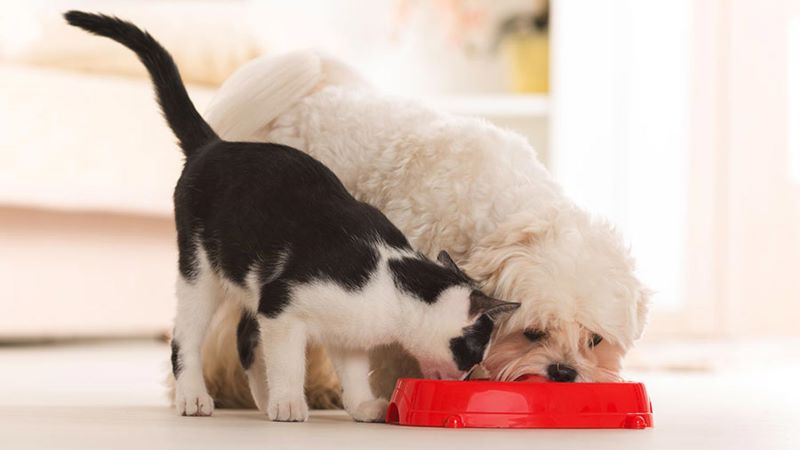The holidays are upon us. And for most of us, that means a houseful of guests, yummy foods and hustle and bustle. Where do your pets fall in all of this busyness? It’s easy to get caught up in the insanity of the season and neglect your furry ones. Follow our tips and you can be sure to have harmony for the holidays.
Don't share all holiday leftovers
Hold off on the leftovers. In the feature The Vets Will See You Now in the November 2016 issue of Real Simple, veterinarian Ann Hohenhaus says, “It’s a risky move” to let your pet eat leftovers due to the high sugar, fat, and salt content in many holiday foods. Fatty foods can inflame your pet’s pancreas and foods like onions, garlic, and chives contain compounds that can damage a dog’s red blood cells, cautions Hohenhaus.
Be careful of new foods
Don’t overwhelm your pet with new foods all at once. The article Holiday Leftovers for Your Pet recommends, “Small, low-fat, non-spicy portions of food.” Anything that deviates from your pet’s normal diet can irritate his stomach.
Know what foods are pet-safe
Some holiday meals may contain dangerous foods for pets.Avoid onions or other alliums (garlic, leeks, scallions), chocolate, alcohol, grapes, raisins, xylitol (a sugar substitute), and nuts. See our post, Holiday Safety Tips for more on the dangers of certain foods, decorations and wrappings during the holiday season.
Pet-friendly Thanksgiving foods
Opt for plain turkey and canned pumpkin if you do want to give your pet a taste of the season. PetMD’s blog post, Holiday Leftovers For Your Pet, mentions that certain foods like turkey, mashed potatoes, and green beans can be given to your pet with your veterinarian’s ok, and with certain considerations. Any excess fat and skin should be removed from the leftover turkey and mashed potatoes should be free of butter and creams. Plain green beans can be enjoyed as a low-sodium treat, but avoid serving your pet green bean casserole.
Make special holiday treats
Yummy food items for you aren’t always best for your pet. Instead of pumpkin pie, consider making your dog some homemade pumpkin dog biscuits. See our post, National Dog Biscuit Day, for a healthy pumpkin dog bone recipe.
Don't overfeed your pet
Learn from yourself. You know how you feel after you overindulge on a high-fat, high-salt meal. Pets don’t have the same sense of self control that humans do, and will overeat if left to their own devices. During the holidays, we tend to fill our homes with baked goods, sweet treats, and rich foods. In her PetMD blog post, Happy Holidays and Healthy Cats, Dr. Lorie Huston warns that “Many of these items can be quite dangerous for our pets, both feline and canine. For cats, chocolate, caffeine-containing foods and beverages, foods containing onions and/or garlic, alcohol and raw bread dough are among the dangers.”
Give your pet exercise
Include regular exercise on your to do list. It can be tough to squeeze in regular walks during the holidays, but there’s no better time to provide your pet with the exercise he needs to regulate his weight, improve his agility, and aid in his digestion. Walking your pet can also alleviate your stress. Check out 3 Reasons to Get Outside and Walk for more benefits of walking your pet.
Consider probiotics for your pet
Start giving your pet a probiotic, with your vet’s permission of course. In the feature The Vets Will See You Now in the November 2016 issue of Real Simple, veterinarian Jim Lowe recommends giving a probiotic two weeks before the holidays, especially if you will have guests who are prone to sneaking your four-legged friend table scraps. Gayle O’Konski, D.V.M., recommends Nutramax Proviable health supplement.
Doing the holidays with your pets doesn’t have to be stressful. With a little preparation and organization, the holiday season will be a breeze for you and your faithful companions.

